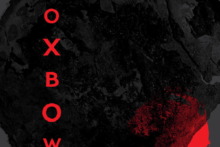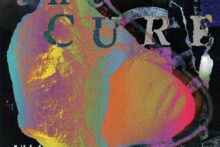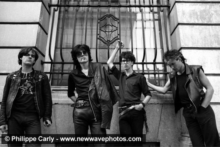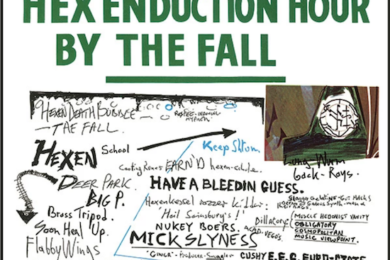When I cracked the spine on Paul Hanley’s excellent book Have A Bleedin Guess recently I immediately saw two quotes about The Fall’s most celebrated album Hex Enduction Hour that made me blanch. They were both attributed to Mark E Smith but they reminded me of a promise I’d made to myself early last year. The first was taken from the pages of Renegade, the autobiography he wrote with Austin Collings in 2009: “I’m still very proud of that album. It’s the one that everyone talks about, and I can see why.” But then immediately after that there was a more typically acerbic sentiment taken from MES’ final interview with Ted Kessler for Q magazine in 2015: “There’s always some cunt who wants me to ask me about a masterpiece I made in 1982.”
Reader, I was that cunt. Or, I was one of them, at least.
When I first interviewed Smith at the end of 2006, I took a bit of a gamble. I told Record Collector magazine I was sure I could get him to talk about Hex Enduction Hour as long as the feature also covered the new (and excellent) album Reformation! Post-TLC. As far as the monthly title was concerned, it was a case of no Hex, no job… and this was a job I really wanted. To be fair, Smith was absolutely accommodating when I spoke to him and he humoured my enquiries about the 1982 masterpiece graciously. This was probably because I spent the first half an hour talking to him about the news, my job, whether I was courting or not, where I grew up and went to school – “St Helens, you have my commiserations!” – and where my mum and dad lived, and then another hour talking about the new album made with the superb but short lived ‘American’ line-up. When I asked nervously, hands still shaking despite now being three lagers and a large whiskey into the afternoon, if I could ask about Hex Enduction Hour, he said, “Course you can cock.”
But why was it was such a big deal that I interview Smith about Hex in the first place? When initially encountering this dense, lengthy, angry and spiteful album it’s not always clear why so many people consider it the pinnacle of the band’s back catalogue. This Nation’s Saving Grace arguably has a better clutch of songs; The Infotainment Scan was much more popular; and even an album like The Unutterable covers more stylistic ground while remaining relatively undiscovered. Anyone who reads this site regularly will know that we don’t have any truck with the canonical, consensus seeking list making of other titles. What’s Going On isn’t even the best album by Marvin Gaye, let alone the best album made by a black man, as most white rock monthlies would have us believe. The reductiveness of list making actually sells music short, reducing it to the level of a fantasy football league. Along with the album rating, all time best of charts should be clicked and dragged into the bin icon of history. Claiming that Low is Bowie’s best album, genuinely does a disservice to The Rise And Fall Of Ziggy Stardust And The Spiders From Mars, Diamond Dogs, ”Heroes”, Blackstar and Station To Station in my view.
However there is something extra special about Hex; maybe if it’s a stretch for you to outright say, hand on heart, that it’s The Fall’s best album, that shouldn’t stop you from recognising that it’s maybe the first among several equals. As I said, when I was reviewing the excellent Sanctuary reissue in 2009: “Even if it’s a fools’ errand trying to decide which is the greatest LP out of The Fall’s huge back catalogue of albums, many fanatics of the group will tell you that the worst thing you can say about Hex is that it’s their equal best at very least.” It was this sentiment that eventually led to my most sophisticated attempt to answer to that most vexatious Fall-related question, what is their best album? And my answer was that at any one time I would always profess to have three LPs in pole position: the current release, whatever it was I was listening to in the car and Hex. There is a sadness to this equation of course now and my answer is merely the CD I listen to in the car and Hex.
Anyway, sat in the bar of the Malmaison hotel in Piccadilly Manchester over the course of three hours, Smith gave me enough for two features. His answers on Hex were noticeably more rehearsed and more succinct than his answers on Reformation and it seemed quite clear when he’d given me enough and it was time for us to talk about something else. But I had enough and published a short rewritten version of it on this site a year or two later. I didn’t think about it again until Smith died in January of 2018 and I had the unpleasant job of staying up all night trying to marshal all of our Fall features, commission obituaries and tribute pieces and so on.
These marathon office sessions are always weird, subdued affairs in which your own feelings get pushed to one side. Characters like Smith (and David Bowie, Prince and Scott Walker) are hugely influential on you from a young age but all of that gets shelved – perhaps permanently even – simply so you can get on with the massive amount of work in hand. I’ve only been upset by the death of one well known cultural figure over the last decade and that was Amy Winehouse in 2011, probably because I wasn’t specifically engaged with her music, didn’t have to write about it and therefore didn’t have to think about her in work mode. And what I was faced with was a crushing sense of anger that someone so young and talented and surrounded by such a large team of people was allowed to die, essentially alone and in pain.
When I got around to republishing my feature on Hex, I wasn’t very impressed with it. Like most things I’d written before giving up drinking it didn’t seem to have any great insight in it. As a piece of writing on The Fall it broke several cardinal rules including repeating Martin Brammah’s daft assertion that they were like “Coronation Street on acid”. But worst of all I kicked dirt over the album’s use of the n-word.
Here’s what I said:
‘From the opening, combative ‘The Classical’ the album seethes with rancour (the opening line “Where are the obligatory n—–s? Hey there, fuck face!” although not racist in the context of the song, is unpleasant to say the least and, unsurprisingly, cost them a record deal with Motown).’
I was mortified at how quickly I’d wrapped up the subject. While this was happening, the narrative of Smith’s death played out on social media as it always does. After the first wave of both heartbroken and casually upset posts from music fans there was a smaller second wave of whataboutery from the grief police – all of it completely fair enough on paper, even if generally speaking, the motivation for this kind of mourner mithering stinks to high heaven… What about the appalling accusations levelled at him in Brix Start Smith’s recent autobiography The Rise, The Fall, And The Rise; what about his violence towards Julia Nagle and what about the lyrics to ‘The Classical’?
It was specifically a tweet written by the editor of The Good Immigrant anthology, Nikesh Shukla, to his followers demanding that I “Google the lyrics for The Classical” which got stuck in my head though. Embarrassed that I had initially fumbled the ball (so I didn’t really have anything substantial to show him), I determined to take a closer look at the song. And here we eventually are. (This essay is in part written up from notes I made in a mad rush for a lecture I gave on Hex Enduction Hour a few weeks after Smith died.)
So the first thing that I failed to do when writing about ‘The Classical’ was to put the song in a solid contemporary context. Smith was far from the only musician dropping the n-word in this period and this usage exists right at the periphery of a much more well established continuum.

The first use of this extremely harsh racial epithet I can find on record, dates back to 1897 ‘N—-r In A Oddity’ by Metropolitan Orchestra on the Berliner record label. If you look through the band’s back catalogue online, they released a string of records at the turn of the previous century with almost transcendentally racist titles. The sort of titles that Skrewdriver would have had second thoughts about using. The reason I bring this up is to show that the use of the most unacceptable levels of racism have been part and parcel of the record industry right from the very get go over 120 years ago.
Fast forward seventy or eighty years and in the context of the European pop culture of the 70s and 80s it seems like you’re mainly likely to encounter harsh racial epithets in two areas. The first, perhaps unsurprisingly, is in the work of neo-Nazi punk and bonehead oi bands. This was music made specifically by and for hardline racists and wasn’t, at any point, notably popular – the most successful of these bands, Skrewdriver, remain at best a shitty but small footnote in the history of rock music. The second arena was a bit more confusing when it came to white rock musicians who used the n-word in the punk/post punk period, as most of the musicians we’re talking about probably aren’t, for the most part, regarded as racist and I’d hazard wouldn’t even think of themselves in such a way. In fact for the most part, a lot of them played black influenced music, shared stages with black musicians and were probably as outraged as anyone over Eric Clapton’s 1976 drunken tirade on stage in Birmingham where he repeatedly shouted National Front slogans and praised Enoch Powell. (This event, and Bowie’s publicly conducted, coked up romance with fascism, were the key drivers of the Rock Against Racism movement. Among the many white punk bands who played successful Carnival Against Racism events were The Fall and Elvis Costello and the Attractions.)
But a lot of these hip young gunslingers who came through with punk were free and easy with the n-word. Patti Smith’s ‘Rock n’ Roll N—-r’; James White And The Blacks – ‘Almost Black’; Nick Cave And The Bad Seeds – ‘Saint Huck’; The Residents – ‘Walter Westinghouse’. The Dead Kennedys struck twice with ‘Holiday In Cambodia’ and ‘We’ve Got A Bigger Problem Now’. Honestly, this is just the tip of the iceberg… you can Google for more but why the fuck would you want to? With some bands you got the uncanny sense that you were essentially just dealing with racists posing as transgressive artists, or at least that’s my take on The Gun Club and tracks such as ‘The Devil And The N—-r’, ‘Black Train’ and ‘For The Love Of Ivy’. Other examples are much more difficult to parse such as Elvis Costello’s lyrics to ‘Oliver’s Army’ in 1979 as they came during the same year that the songwriter got into a drunken brawl in a Holiday Inn and called James Brown and Ray Charles so many racial slurs, it made the national news. This appalling incident can still seem surprising, especially given Costello’s devotion to black music and his many collaborations with black musicians; and, indeed, he has apologised in a seemingly sincere way numerous times over the length of his career for the hateful incident, most recently in his 2015 autobiography Unfaithful Music & Disappearing Ink in which he recounts what he did in a way that is unsparing (to himself) and concludes: “Never mind [my] excuses. There are no excuses.”
I think out of all of these incidents, Costello in 79 shows the real problem with what I’d call hipster racism. This type of lyricism tends to come from edgy artists who no doubt think of themselves as inclusive both wanting to show how antagonistic to the mainstream they are while also sending out a complex if slightly confused message about authenticity to listeners. In most cases, there is a lot of subtext, which seems to include: A. “Hey! I’m cool!” B. “I’m streetwise and/or inner city working class by the way and definitely not bourgeois liberal middle class or from a small town.” C. “I’m actually really relaxed around non-white people, I’m round them all the time, some of my best friends are black, which is why it’s ok for me to use these epithets.” And yet, confusingly, it also suggests that, D., the lyric writer might also be a bit of a racist – or at the very least capable of racism – they just don’t necessarily know it yet.
(I’m limiting myself to the n-word here for good reason. If we start looking at punk, post punk and new wave and racism in general we’ll be here all day, sadly. There is another feature to be written on this subject and I’m pretty sure it would reveal a lot about changing attitudes. Siouxsie Sioux was, quite rightly, dragged across the coals for the use of anti-semitic language in the original version of ‘Love In A Void’, while the use of a racist term against Asians in the original version of ‘Shoplifting’ by The Slits seems to have pretty much passed without comment.)
Using the n-word as a kind of badge of authenticity dates back to rock music’s ur hipsters Lester Bangs, John Lennon and Bob Dylan who all have form in this field. (The racism of Bangs especially, the unsatisfactory way that he dealt with it and the negative effect he has had on rock writing in general is another issue that needs exploring in depth elsewhere.) But we shouldn’t assume that this is something that doesn’t apply now. It’s really only a few years since Bjork blotted her copybook this way in 2015 and I would be surprised if this doesn’t keep on happening.
So, when we look at Smith and ‘The Classical’ I think it’s important to set the use in this kind of context. Although straight away I have to concede that things are never particularly simple with anything that he says or writes. On paper, MES should have more of a rock solid excuse than any of the other musicians mentioned above because he was, at times, a narrative songwriter. Punk had its fair share of sophisticated song writers and some of them, perhaps unfairly, weren’t afforded the same serious level of lyrical criticism that they would have done had they been working in another more established genre such as folk. The Cure’s ‘Killing An Arab’, is obviously written from the point of view of Meursault, the protagonist of Albert Camus’ absurdist novel L’Etranger. Should Robert Smith, who was a teenager when he wrote it, have “read the room” first? Well, probably, but show me anyone who can look back at their teenage years without wishing that they’d had 20/20 vision over everything they were doing and I’ll be amazed. Mark E. Smith’s literary pretensions ran much deeper than those of The Cure. Not only did he name his group after another absurdist novel by Camus, La Chute, but his own lyric writing style went much deeper, influenced by the likes of Arthur Machen, Wyndham Lewis and Vladimir Nabokov, often incorporating a kind of cut up that included switching between first, second and third person (often within the same song) as well as incorporating “found sound” (or overheard snippets of conversation). When you factor in his tendency to be an “unreliable narrator” and the technique of temporal and spatial slippage, you, as the listener are left, purposefully, somewhere that is constantly shifting and impossible to locate.
It was this very confusion which has until recently shielded The Fall from the same criticism meted out to some of their contemporaries according to Mark Fisher, writing in Memorex For The Krakens: The Fall’s Pulp Modernism Part III on his K-Punk blog. He referred to the “unplaceability” of these lyrics as the thing that gave him a pass: “Intent was unreadable. Everything sounds like a citation, embedded discourse, mention rather than use.” As Annotated Fall add: “It is always important to remember that the narrator of a Fall song is rarely, if ever, a straightforward self-representation of Mark E Smith.” The problem remains that Smith never explained his lyrics or how they were to be interpreted so even if the main problem was only Smith’s intention (which is arguably not the case) it’s now impossible to say definitively what they were anyway. As Paul Hanley sums up in Have A Bleedin Guess: “In short Mark gets away with it because we’re never sure why he said it, or at what points in the song (if any) the character singing is himself.”
Perhaps the only thing we can say with any certainty is that the use of the n-word is particularly heavy in this track. Rancorous and belligerent are two ways of describing it.
When you come to the following lyrics cold in 2019, the case against The Fall must seem pretty stark:
Hey there fuckface!”
And if you’ve never heard this song before, it sounds even worse than it looks written down, like a slap across the face.
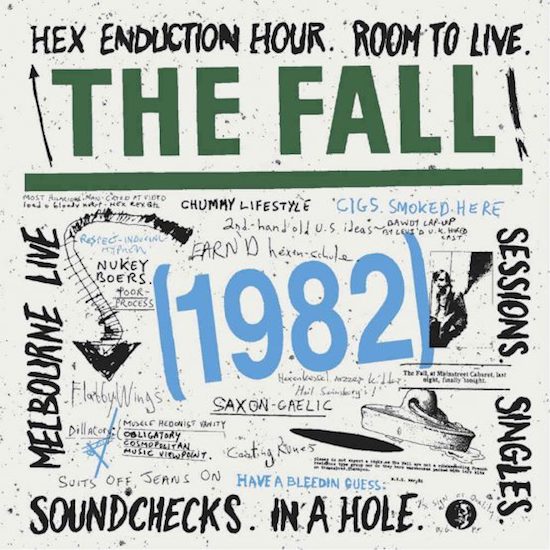
Now, if you want to know anything about the lyrics of The Fall, forget sleevenotes and forget books, as the first place you have to look is the Annotated Fall, a website which is close to being the font of all knowledge. So I want to thank that site and acknowledge them before continuing.
The website leans toward the Fall faithful party line that the song is sung from the narrative perspective of someone who only pays lip service to inclusivity while remaining intolerant at heart, although it does consider the track from every point of view and not just if the song was intentionally racist or not.
We know from Smith himself that the protagonist is working on some kind of art or music program, and TV culture seems to be something that was playing on his mind around this period. The cryptic sleevenotes on the album include digs at Roy Castle and Clive James. The opening line for me feels like a sideswipe at talk show host Melvyn Bragg. He was the host of the South Bank Show at the time. I get the feeling this is the kind of liberal arts show that really got on Smith’s nerves.
If you look at the offending lyric in the context of Smith’s entire body of written work and in the context of the song, the idea that it is delivered without racist intent is believable. Smith wrote enough songs to fill books and there are no other lyrics in this giant body of work that suggest that he or the band had a racist agenda or that he was singing to the stalls or much that could be interpreted as dogwhistle racism even. (Absurdist non-sequiturs such as “Jew on a motorbike!” from the song ‘Garden’ make a lot more sense when explained, unlike ‘The Classical’.)
This one line from ‘The Classical’ even when taken on its own out of a four decade history of songs is still clearly a problem however. Whether Smith intended it to have straightforward racist connotations or not doesn’t really get to the heart of whether it’s justified. And to make matters worse, just because there was a lot of it about in the early 80s, that doesn’t really help us now in 2019 as things have changed quite radically since then.
Something commented on much less is the fact the show’s host seems to have a problem along all angles of inclusiveness: “Too much reliance on girls here/ Behind every shell-actor/ (queer and deformed).” And that’s before we get to the protagonist’s problem with new romantics.
Smith’s defence when asked about it – and he was actually asked about it a lot – was always that he was being sarcastic. But sarcastic or not, he sometimes seemed almost proud of the upset that the lyrics to ‘The Classical’ had caused. While insisting that his use of language was not bigotted, Smith would mock people who were offended by the lyric. This impression for me is underlined by the number of times Smith trotted out the story that the offending line cost the band a £46,000 record deal with Tamla Motown. To me this sounds like more of Smith’s perversity, something backed up by Mick Middles in his book The Fall – it’s not a complete fabrication but didn’t happen in the way Smith told it. But whether it’s true or not, what kind of person would revel in this situation? And in any case in some tellings of the story, Smith reveals himself to be, at that moment at least, quite indistinguishable from a saloon bar xenophobe.
(There is of course a massive and genuine Fall connection with Motown, it’s just that in temporal terms it hadn’t happened by 1982. The Fall would have one of their biggest hits with a song written by the genius African American songwriting team of Holland, Dozier and Holland for one of Motown’s rare white signings, R Dean Taylor and ‘Ghost In My House’. The Fall version got to number 30 in the charts in 1988. The group would also cover Taylor’s only other UK hit, ‘Gotta See Jane’ in 2001 on Are You Are Missing Winner. Was there something going on here? Again, we’ll never know.)
It should be noted that when The Fall brought ‘The Classical’ back into their live set in 2002, Smith left the offending line out, showing that in the new millennium the times they were a changing for everyone… even The Fall.
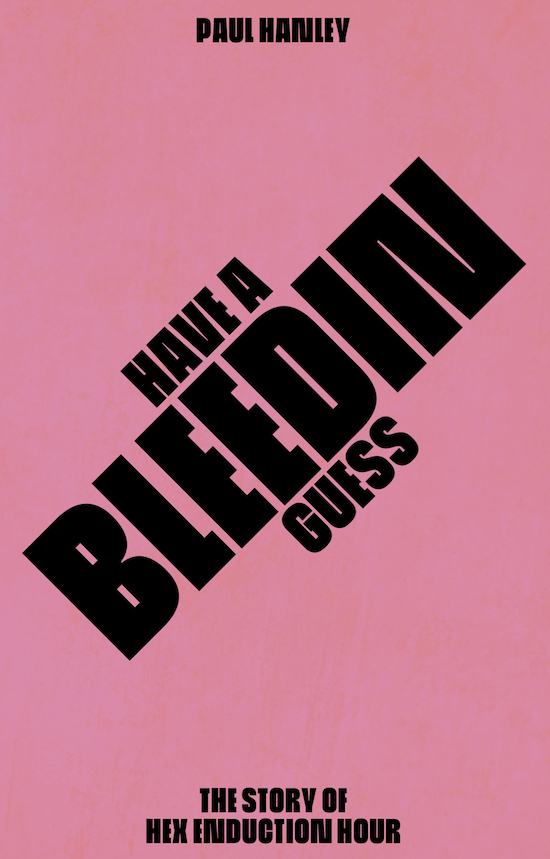
So, given that you’ve managed to get this far, you may be forgiven for asking, well, what do I think?
My serious answer is this: who gives a fuck what I think. Like I said, the times, they have a changed. There has been a wider shift in culture not just since this song was written but since I became a music writer in 2003 and really it has nothing to do with Mark E Smith and everything to do with me – or the multiple problems with people like me. This history of rock music can essentially be viewed as a bunch of white hipsters telling us what is and isn’t OK. And they’ve either always told us that it’s totally fine for white musicians to be using this language or that it’s not. How magnanimous of them. So really the main thing I wanted to say is that it’s about time we started asking POC writers what they think of songs not just like The Classical but all the others I mentioned earlier as well. And of course, it’s time for us to answer, no matter if we find it irritating, when writers like Nikesh Shukla ask us questions.
I asked all the POC writers and friends of this site who I was pretty sure liked The Fall, what they thought of the lyrics and this is what the three people who answered had to say.
Gabriel Ebulue of the excellent the three track podcast got straight back to me when I emailed him to ask if he thought the lyrics to The Classical were racist or not: “You’re absolutely right about asking POC about these lyrics. To a point, unfortunately, I feel that as a black man liking music made mainly by white people it means I will have to wince every now and then at lyrics… not to mention whatever Morrissey says… ever. But, my rationale is that as long as it is not intended to harm I try not to take it to heart, which leaves a lot of grey area. For example in the songs of The Gun Club was Jeffrey Lee Pierce singing as a character in a story in the South [or was he a racist]? Most of the time you can tell the difference or at least I can feel it out for myself, if that makes sense.
“As far as ‘The Classical’ goes, I never felt the racism. The word always sticks out as it always will but I never felt it to be intending harm or malice. In the context of the song, it’s still pretty bad as the word feels forced in there so I’m not forgiving the use or sweeping it under the carpet but it never made me feel a certain type of way. But that might be because of my love of The Fall and their work being more important to me than just this lyric. For me it’s just an unfortunate blemish on an amazing song which is on an even more amazing album.
“It’s tough. The lyrics to ‘The Classical’ have made me uncomfortable and the word is a racist word, you can’t really say it’s not, it’s just that I never took offence to it in a way that I have to other lyrics such as those written by Jeffrey Lee Pierce of The Gun Club.”
When I posed the same question to sometime tQ scribe, media mogul, well-dressed frontman of Oxbow and pugilist, Eugene Robinson, he got straight to the point: “I find most discussions of ‘race’ and ‘racism’ facile with a great and grand tendency to make me sleepy and this issue is no different. But I’m extremely hard to offend and it usually takes more than a pointed but artful use of the word ‘n—-r’ to excite me to action. It’s all about intent at the end of the day. So if I say, “John, I’m going to fuck your ass” in person it probably carries more weight than if I write a song called ‘John, I’m Going To Fuck Your Ass’. Yes?
“Also it’s probably different to hear these lyrics from Mark E. Smith than it would be to hear them from Boris Johnson. And The Fall is probably very different in their worldview from Skrewdriver.
“But at the end of the day the intent is usually to upset, offend, or generate a certain amount of fear. All of which good art might sometimes do. And if done in abstract, it’s totally fine by me. If it rubs me the wrong way I can turn it off.
“In person however? Well who knows what I’ll do? Which is always a good place to be. That is to say, were Mark E. Smith to be alive and were he to call me a n—-r I would be as likely to laugh in his face as I might be to beat him to death. Who can tell? Certainly not me. Which is why it is always best to err on the side of caution. And intelligent life choices.”
And finally, long-standing tQ writer Kiran Acharya sent me a succinct text saying: “Of course it’s not racist. Don’t be mad.”
Nothing I can say, can top the lived experience of these three writers, so I’ll just end by saying simply Hex Enduction Hour remains my joint favourite Fall LP, extreme warts and all (along with Imperial Wax Solvent which is currently in the CD player of my Mazda Bongo Friendee).
Cherry Red’s Hex Enduction Hour 3LP set/ 1982 CD box set is out now. Have A Bleedin Guess is published by Route


